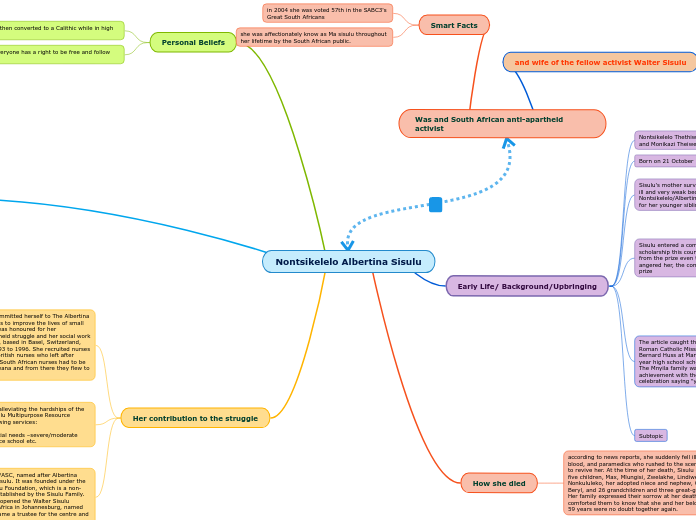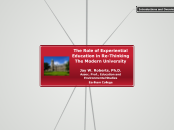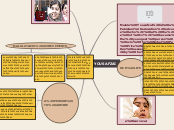Was and South African anti-apartheid activist
Smart Facts
she was affectionately know as Ma sisulu throughout
her lifetime by the South African public.
in 2004 she was voted 57th in the SABC3's
Great South Africans
and wife of the fellow activist Walter Sisulu
Nontsikelelo Albertina Sisulu
Her contribution to the struggle
Multipurpose Resource Centre/ASC, named after Albertina Sisulu, was also founded by Sisulu. It was founded under the auspices of the Albertina Sisulu Foundation, which is a non-profit organization that was established by the Sisulu Family. Weeks later, she and Mandela opened the Walter Sisulu Paediatric Cardiac Centre for Africa in Johannesburg, named for her late husband. She became a trustee for the centre and helped fundraise for it.
Sisulu and her family were residents of Orlando West, Soweto, South Africa, when it was established. Mrs. Sisulu has witnessed first-hand the development of the community where the Sisulu family lived, sorely lacking in social services and despite enormous obstacles
she has committed herself to alleviating the hardships of the community. The Albertina Sisulu Multipurpose Resource Centre/ASC provides the following services:
A school for children with special needs –severe/moderate intellectual challenge – resource school etc.
An Early Childhood Development Centre for learners from the age of three years
A section for the out of school youth with disabilities established with an intention to provide them with skills which would render them employable and active participants in the country's economy
A nutrition programme for the needy earners
A multi-purpose community hall
An outreach program
more than 50 years, Sisulu committed herself to The Albertina Sisulu Foundation, which works to improve the lives of small children and old people. She was honoured for her commitment to the anti-apartheid struggle and her social work when the World Peace Council, based in Basel, Switzerland, elected her president from 1993 to 1996. She recruited nurses to go to Tanzania, to replace British nurses who left after Tanzanian independence. The South African nurses had to be smuggled out of SA into Botswana and from there they flew to Tanzania.
Interesting Facts
Her husband, Walter Sisulu was found guilty of high treason and sabotage, but was spared the death sentence. He instead spent 25 years in custody on Robben Island alongside Nelson Mandela, whom he had brought into the ANC. While her husband was on Robben Island, Sisulu raised the couple's five children alone. She spent months in jail herself and had her movements restricted
Sisulu first met Walter Sisulu in 1941 while working at Johannesburg General Hospital; at that time he was a young political activist. They married in 1944. The Sisulu's– a lawyer and a nurse – married in 1944 at a ceremony in which Nelson Mandela was the best man. Also present were Anton Lembede and Evelyn Mase.The couple had five children, Max Vuyisile, Zwelakhe, Mlungisi, Lindiwe and Nonkululeko, and adopted four others including Samuel Sisulu a political activist. An adopted daughter, Beryl Rose Sisulu, served as ambassador from the Republic of South Africa to Norway. { they were married for 59 years}
She became national co-president of the liberal United Democratic Front at its inception in 1983. Later she joined the ANC Women's League and was elected deputy president, and in 1994 she became a member of Parliament before retiring in 1998.
2013, the section of the R24 Route in Gauteng, from OR Tambo International Airport in Ekurhuleni, through Johannesburg and Roodepoort, to Krugersdorp East (every street making up this section) was named after Albertina Sisulu. The freeway section of the R24 is named the Albertina Sisulu Freeway while the non-freeway section of the R24 is named Albertina Sisulu Road.[10][11]
On 23 October 2014 the city council of the City of Ghent (East-Flanders, Belgium) decided to name its new pedestrian and cyclist bridge over the river Scheldt "Albertina Sisulubrug" (Albertina Sisulu Bridge) in honour of Albertina Sisulu.[13] The bridge links the new city library, called the Krook ("Krook" being the old Dutch word for a bend in the river), at the Miriam Makebaplein (Miriam Makeba Square) to the Kuiperskaai.
Personal Beliefs
she believes that everyone has a right to be free and follow they're dreams
she was a christian then converted to a Calithic while in high school
How she died
according to news reports, she suddenly fell ill, coughing blood, and paramedics who rushed to the scene were unable to revive her. At the time of her death, Sisulu was survived by five children, Max, Mlungisi, Zwelakhe, Lindiwe and Nonkululeko, her adopted niece and nephew, Gerald and Beryl, and 26 grandchildren and three great-grandchildren. Her family expressed their sorrow at her death, but said that it comforted them to know that she and her beloved husband of 59 years were no doubt together again.
President Jacob Zuma paid tribute to Sisulu in the wake of her death saying "Mama Sisulu has, over the decades, been a pillar of strength not only for the Sisulu family but also the entire liberation movement, as she reared, counselled, nursed and educated most of the leaders and founders of the democratic SA", Zuma said.[8] He also announced that Sisulu would receive a state funeral, and that national flags would be flown half-mast from 4 June until the day of her burial.[9]
Early Life/ Background/Upbringing
Subtopic
The article caught the attention of the priests at the local Roman Catholic Mission who then communicated with Father Bernard Huss at Mariazell. Father Huss arranged for a four-year high school scholarship for Sisulu at Mariazell College. The Mnyila family was very happy and celebrated Sisulu's achievement with the entire village, Sisulu recalls that the celebration saying "you would have thought it was a wedding"
In 1936 Sisulu left for Mariazell College in Matatiele in the Eastern Cape and although very nervous she was excited to find that a local girl from Xolobe was a prefect at Mariazell.
school's routine was rigid and strict, pupils were woken up at 4am to bath and clean their dormitories, they would then proceed to the chapel for morning prayers. Sisulu's scholarship was covered her board and lodging she had to pat it back during the school holidays by ploughing the fields and working in the laundry room, she only went home on the december holidays but she found this is a small price to pay fort eh opportunity to attend high school
with high school ending in 1939 Sisulu decided what she would do she wouldn't marry but rather become a working professional so that she can support her family in Xolobe
Whilst Mariazell Sisulu had converted to Catholicism and, because she had resolved to never marry she decided to become a Nun, she admired them and they're dedication of the nuns who taught at the college
Father Huss advised her against becoming a nun because they did not earn enough of a salary nor did they leave the mission posts, so she wouldn't be able to support her family in ways she wanted, instead she was advised to apply to various nursing schools. She was accepted as a trainee at a Johannesburg " Non-European" Hospital called Johannesburg General. Spending Christmas with her family in Xolobe she left Johannesburg in January 1940
Sisulu entered a competition to win a four-year high school scholarship this counted against her as she was disqualified from the prize even though she had come in first place. this angered her, the competition had not set no age limit on the prize
her teacher wrote a local Xhosa Language newspaper, making a strong case for sisulu to be given the prize
her teachers name is: Imvo Zabantsundu
Sisulu's mother survived the Spanish FLu, but was constantly ill and very weak because of this. it fell upon Nontsikelelo/Albertina as the eldest girl to take on a motherly for her younger siblings
She had to stay out of school for along periods of time, which resulted in her being two years older than her classmates in her last year of primary school, she adopted the name albertina when she started schooling at a Presbyterian mission school in Xolobe
Her leadership qualities and maternal instincts underlined the respect she earned during the struggle when she was referred to as the Mother of the Nation, she excelled at school in cultural, sporting activities and she showed her leadership skills at an early age she was chosen as head girl in standard five
her classmates did not seem a major inconvenience at the time she finished primary school
Born on 21 October 1918, in Tsomo district of the Transkei
Nontsikelelo Thethiwe second of the five children of Bonilizwe and Monikazi Theiwe









